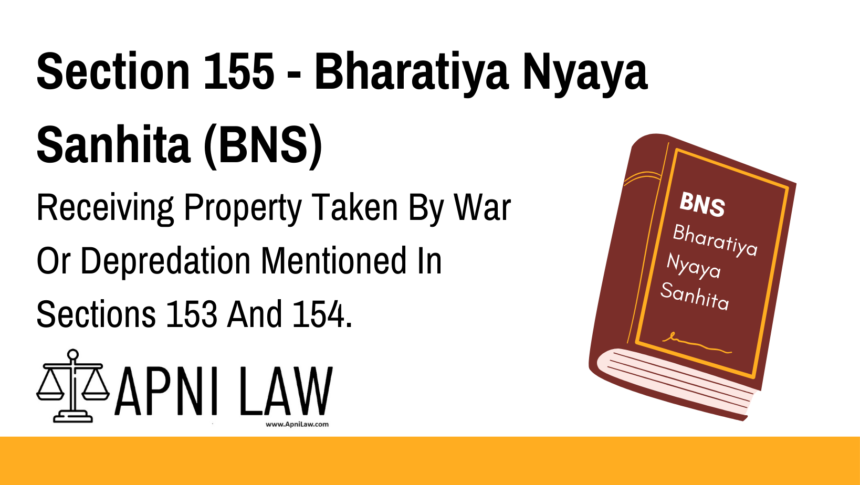Code – Section 155 BNS
Whoever receives any property knowing the same to have been taken in the
commission of any of the offences mentioned in sections 153 and 154, shall be punished with
imprisonment of either description for a term which may extend to seven years, and shall also
be liable to fine and to forfeiture of the property so received.
🔗 Section 153 BNS – Waging War Against a Foreign State
🔗 Section 154 BNS – Committing Depredation on Foreign Territories
Explanation of Section 155 BNS
Section 155 BNS criminalizes the act of receiving property that has been obtained through:
-
Waging war against a foreign state (Section 153 BNS).
-
Depredation on foreign territories (Section 154 BNS).
Key Elements of Section 155 BNS
-
Receiving Property:
-
The person must have received or possessed the property.
-
-
Knowledge of Illegal Origin:
-
The person must be aware that the property was obtained through war or depredation.
-
-
Punishment:
-
Imprisonment up to seven years.
-
Fine.
-
Forfeiture (confiscation) of the received property.
-
Illustrations of Section 155 BNS
Example 1: Trading in Looted Goods
A smuggler buys gold, weapons, or valuables from a group that stole them during an armed rebellion in a foreign country. Since the buyer knows the property was obtained illegally, they are guilty under Section 155 BNS.
Example 2: Receiving Stolen Vehicles from War Zones
An individual knowingly purchases stolen vehicles or military equipment from a conflict zone where depredation has taken place. This is punishable under Section 155 BNS.
Example 3: Black Market Deals
A businessman purchases diamonds, artifacts, or electronics smuggled from a war-affected region at a lower price. If he knew they were obtained through war or depredation, he is liable under this section.
Example 4: Receiving Digital or Financial Assets from War Crimes
If someone receives cryptocurrency, bank funds, or any form of digital assets obtained through financial crimes linked to war or depredation, they can also be prosecuted under Section 155 BNS.
Common Questions and Answers on Section 155 BNS
1. What type of property is covered under this section?
Any property obtained through waging war (Section 153 BNS) or depredation (Section 154 BNS), including:
-
Money and valuables (gold, cash, jewelry, artifacts).
-
Weapons and military equipment.
-
Vehicles, livestock, industrial goods.
-
Digital assets (cryptocurrency, bank accounts, stocks, etc.).
2. Can someone be punished if they unknowingly receive such property?
No. To be convicted under Section 155 BNS, the accused must have known that the property was obtained through war or depredation. However, ignorance must be proven in court.
3. What is the punishment for receiving such property?
-
Up to 7 years of imprisonment.
-
Fine.
-
Forfeiture (confiscation) of the property.
4. How is Section 155 BNS different from receiving stolen property under general law?
-
Section 155 BNS applies specifically to property obtained through war or depredation.
-
General laws on stolen property (such as Section 411 IPC) cover theft, robbery, or other forms of stealing.
5. Can organizations or companies be held liable under this section?
Yes. If a company purchases or trades in assets obtained through war or depredation, it can be prosecuted.
Conclusion
Section 155 BNS ensures that no one benefits from illegal war profits or stolen assets from foreign depredation. By imposing strict penalties, including imprisonment, fines, and property confiscation, it discourages black market trade linked to conflicts.
For more legal insights, visit ApniLaw today! 🚀








